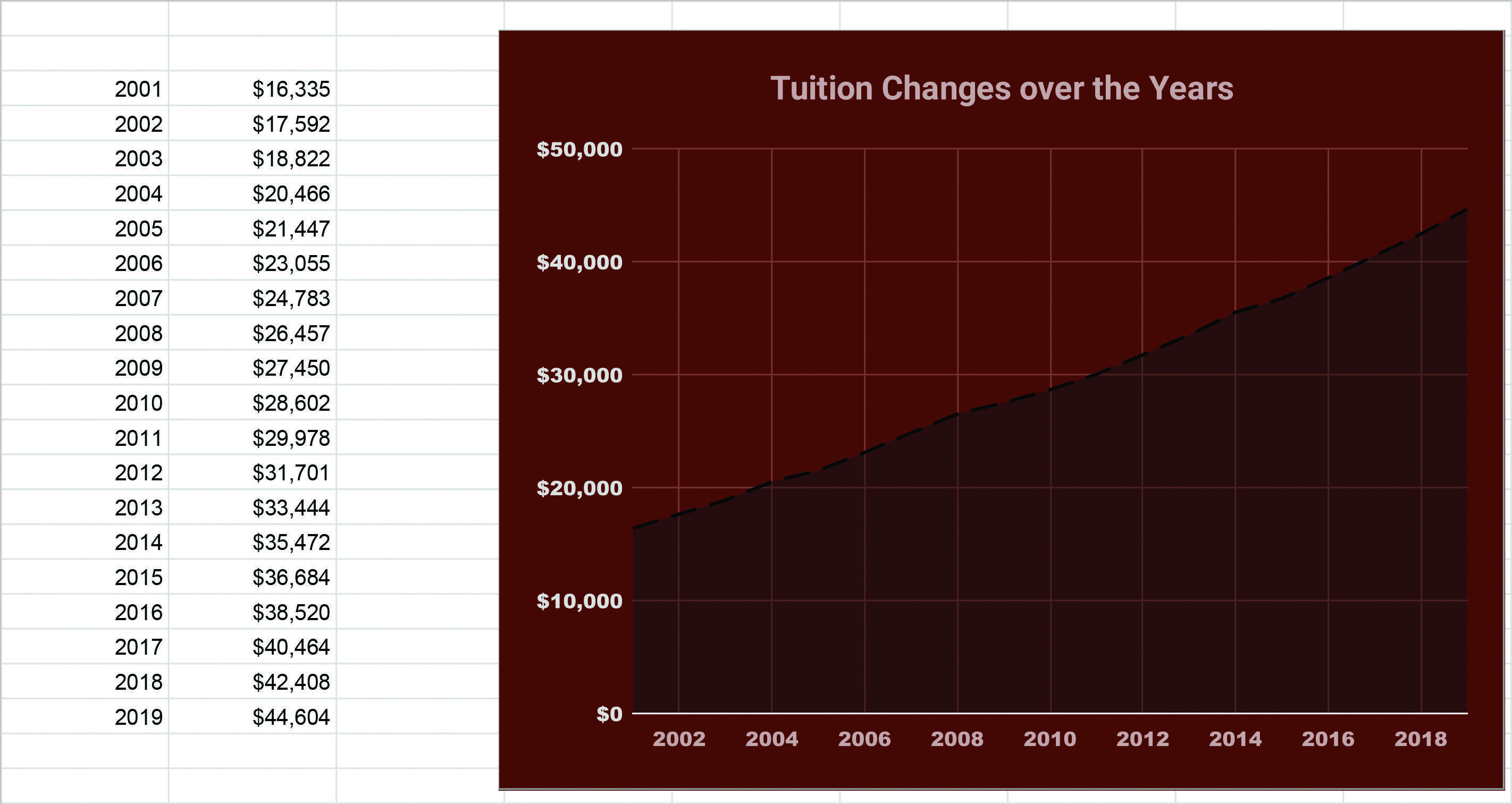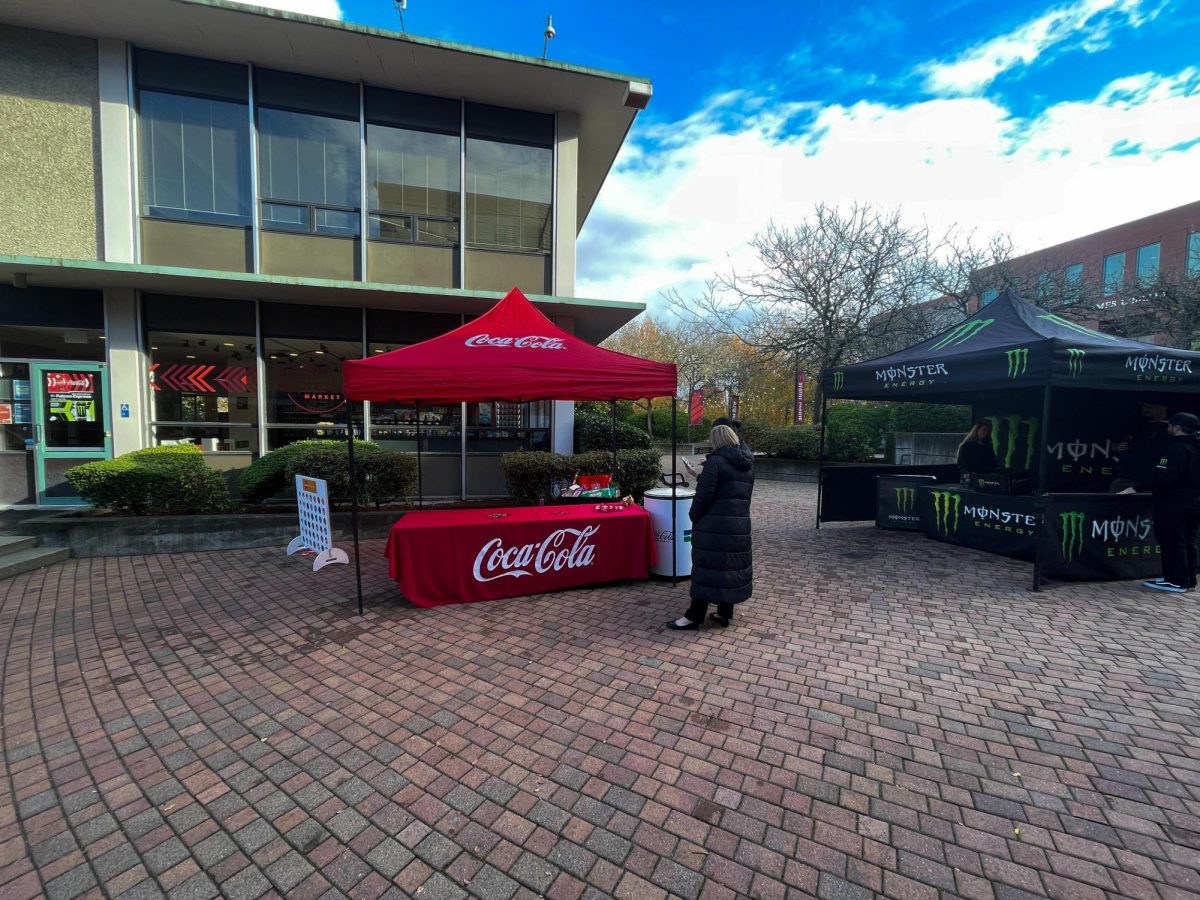Featured photo: Tuition prices at Seattle Pacific University have risen once again.Max Briggs | The Falcon
Seattle Pacific University tuition has risen steadily for decades. With the 4.8% increase this coming 2019-20 school year, tuition will sit at $44,604 annually.
By comparison, in 2014 tuition was $35,472 annually, a difference of over $9,000 across only five academic years.
The reality of the tuition records show that this is not a one-time or infrequent occurrence, but a pattern: tuition has been going up steadily for at least 20 years, as far back as the records show.
Between 2000 and 2001, tuition increased from $16,335 annually to $17,592 (7.4%). 2002 – 2003 featured a similar increase of a bit more than $1,200 (6.7%).
By 2007, the trend had moved closer to $2,000 increases annually (such as the 2007-2008 increase of 6.5%, and has maintained a relatively steady pace since, with the difference between 2017 and 2018 being $1,944 (4.6%).
The most prominent student question seems to be, “Why? What is the money going towards, and how will it benefit students?”
SPU student Emily Markert stressed frustrations about the increases in tuition annually.
“Overall, I feel like the constant increase just puts me and other students more in debt and I don’t really see the benefit.”
According to Nate Moutter, SPU vice president for enrollment management and marketing, the funds are carefully planned for a purpose.
“Over 75 percent of the university’s educational and general budget goes to support the people (faculty, staff, and student employees – 61%) and buildings (16%) used to provide the overall student experience,” Mouttet explained.
He detailed some of the specific areas where additional funds were necessary this coming year.
“Specifically, next year’s budget plan provides a 1% increase to the pool of funding available for faculty and staff wages. The cost of maintaining a quality institution in the heart of a vibrant but expensive city is very challenging,” said Mouttet
Jordan Grant, associate vice president of enrollment operations and Student Financial Services, offered some clarity on exactly what other things tuition is used for that might cause it to increase.
“One thing that’s unique about a university is that we’re kind of like a city. You can get most of the services that you need here: you can eat here, get healthcare here, get entertainment here,” Grant explained in an interview.
On that note Mouttet explained that “the university believes that the increases bring added value each year to the student experience. SPU never wants to price tuition beyond what students are willing to pay, yet it knows one of the most important factors of why students choose SPU is its location.”

The other contributing factor, according to Grant, is the location of the university. The cost of living and operating in Seattle is unquestionably high, and Grant said that this affects the cost of running the university and all its factors. “[It is] one of the highest cost areas in the country, so it works out that increases tend to happen,” he explained.
Markert felt that the constant increases are unnecessary burdens on students, and that the reasons of location are not sufficient explanations for why she felt she has not seen changes on campus as a result of increased funds.
“I realize that it is expensive to be in Seattle and to run a university however, I don’t see a difference in the school as a student and I have been here for two and a half years,” said Markert.
Mouttet explained the process of deciding to increase tuition, and who is involved in that process.
“The vice president for finance and business affairs organizes and leads a process that gathers input from across campus to identify and verify all inputs into the budget modeling,” Mouttet said.
“Throughout the process, the entirety of the budget planning is reviewed with a Faculty Budget and Stewardship Committee, Student Budget Committee and Senior Leadership Team,” Grant said.
When asked how students might see the benefits of the tuition increase in a tangible way on campus, he detailed the ways that funds help our facilities and staff function.
“What it helps to do is maintain if not improve our ranking for best national university; in terms of instruction that students receive, facilities that they receive and hopefully having really competent staff that stay on, that are being compensated in a way that they’re encouraged to stay here,” Grant said.
“At the same time I know that there’s always a desire … to tighten belts, to make use of the resources we have.”
Grant used his own department, Student Financial Services, as an example, and said that they have not increased staff in years and have actually decreased recently. According to Grant, they are doing all they can to use the funds and staff they have to the fullest.
It is important to note that the while the overall gross tuition increase has been 4-5%, and the resulting overall net tuition increase has been in the 2-3% range.
It is important to note that room and board rate increases for those students living on campus has been below this 4-5% increase in recent years.
When asked about the effect of the increase on enrollment, and whether he thought there will be a decrease due to the additional 4.8% in next year’s tuition, Grant was hopeful.
“I don’t think so. At the same time, there are student situations where these kind of increases matter … There are a number of things we look at to make sure that it doesn’t affect enrollment, and this is where I’d hope Student Financial Services could step in.”
He explained that SFS offers help to student with payment plans, scholarships, and other financial assistance that he said might help make the increased cost more manageable.
These payment plans will be of use not only this year but also in the years to come, according to Mouttet.
When asked if he expected tuition to continue to rise at the same rate, he answered in the affirmative.
“Yes, without significant growth in enrollment or the cessation of inflation in the Seattle area, there will be some level of annual tuition increase.”
However, according to Mouttet, these increases will be beneficial to students in tangible ways.
“In exchange for these higher costs, SPU students are provided access to all that is available in the city. The university believes this access radically shapes the kind of learning environment it can provide in contrast to schools that aren’t located in a world-class city like Seattle.”
Markert expressed less enthusiasm regarding the tangible changes caused by the funds. She said that she cannot see any difference in campus life, and she feels that she should.
“If prices are going to up, I feel like we should be seeing some difference, like more study places for example or some renovations of old buildings.”
Grant’s optimism about SFS and its ability to help manage these increases is not unfounded: he has been in university financial services since 1984, and he said that SPU is different from other schools he’s seen in their aide systems for student finances.
“One thing that I’ve noticed here that’s different from other places I’ve been is when students have found themselves in a place that’s difficult financially we actually have strategies built in to support those students,” Grant said, “and students don’t even know about that.”






















































































